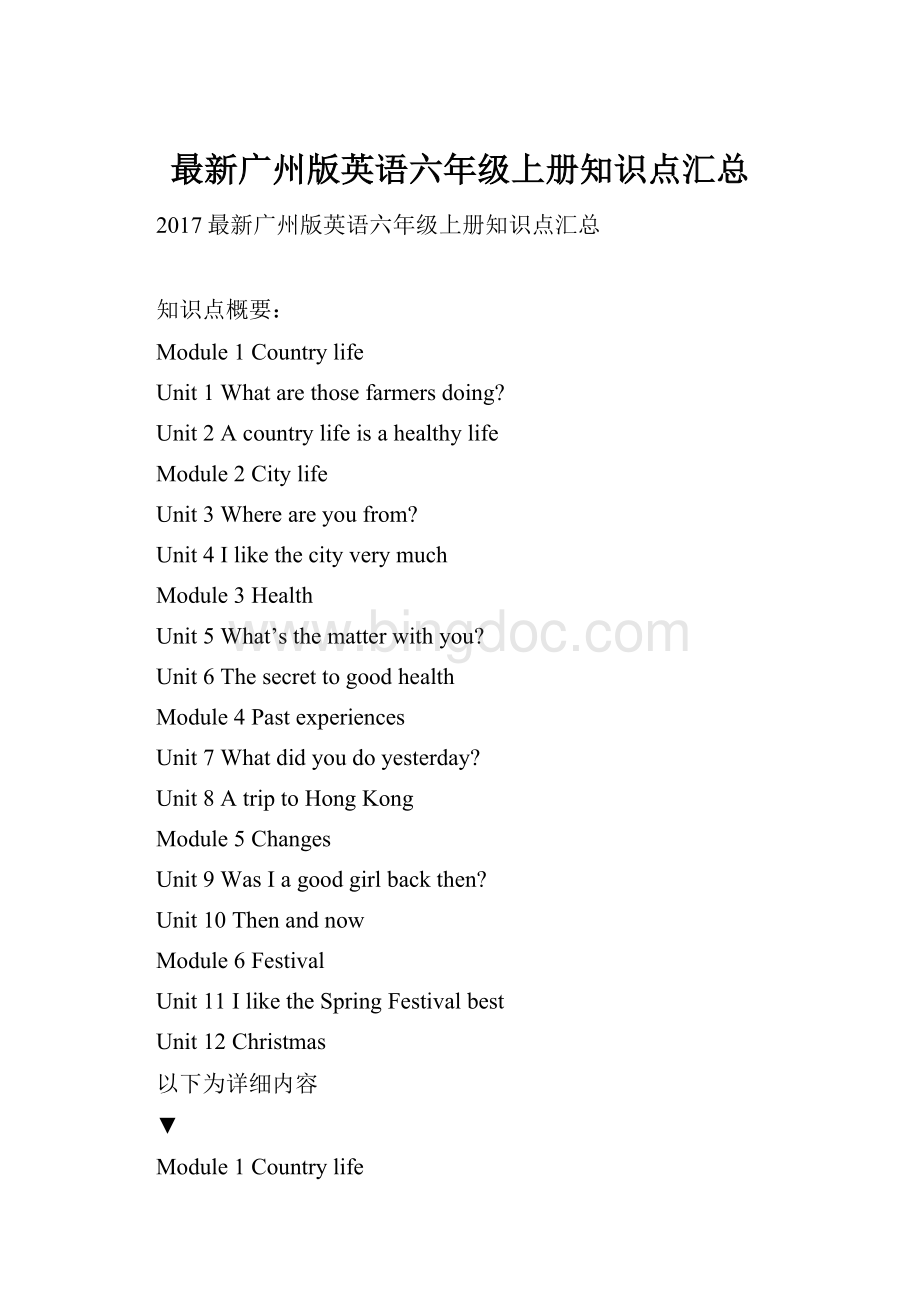最新广州版英语六年级上册知识点汇总.docx
《最新广州版英语六年级上册知识点汇总.docx》由会员分享,可在线阅读,更多相关《最新广州版英语六年级上册知识点汇总.docx(32页珍藏版)》请在冰点文库上搜索。

最新广州版英语六年级上册知识点汇总
2017最新广州版英语六年级上册知识点汇总
知识点概要:
Module1Countrylife
Unit1Whatarethosefarmersdoing?
Unit2Acountrylifeisahealthylife
Module2Citylife
Unit3Whereareyoufrom?
Unit4Ilikethecityverymuch
Module3Health
Unit5What’sthematterwithyou?
Unit6Thesecrettogoodhealth
Module4Pastexperiences
Unit7Whatdidyoudoyesterday?
Unit8AtriptoHongKong
Module5Changes
Unit9WasIagoodgirlbackthen?
Unit10Thenandnow
Module6Festival
Unit11IliketheSpringFestivalbest
Unit12Christmas
以下为详细内容
▼
Module1Countrylife
Unit1Whatarethosefarmersdoing?
一、词组
feedthechickensandducksfeedthepigsfeedthehorse
growflowersandvegetablesplanttreescutgrass
anyotheronthefarmafew…
二、句型:
1.Whatarethosefarmersdoing?
They’recuttinggrasstofeedtheanimals.
2.Whatdoyougrowonyourfarm?
3.Wehaveafewgoatsandpigs.
4.Therearefruittreesinthisfield.
5.Thereisacowonthefarm.
三、重点精析:
1.anyother+名词单数,指一堆当中的的某一个
anyother+名词复数,指一堆当中的一些
如:
Tomrunsfasterthananyotherstudentinhisclass.
汤姆比他班上的任何人都跑得快。
Areyoutakinganyotherdrugsatpresent?
你现在还有服用其他的药吗?
2.表示肯定意义:
alittle/afew有一点,有一些
表示否定意义:
little/few几乎没有的
afew/few+可数名词复数
little/alittle+不可数名词
many/much意为很多的
many+可数名词复数much+不可数名词
3.usesth.todosth.用……做某事
我用钢笔写信。
___________________________________________
4.manyofthem他们中的许多人
manyofusmanyoftheboysmanyoftheyoungmen
5.befrom=comefrome来自……
他来自中国。
______________________________________________
6.also;too;either的区别
(1)also意思是“也”,是比too较为正式的用语,通常用于肯定句中,一般靠近动词。
如:
Healsoaskedtogo.他也要求去。
Ialsowent.我也去的。
Hecamealso.他也来的。
(2)too意思也是“也”,是最普通的用语,常与also通用,但不如also正式,在口语中它用得更多。
too通常放有句末,它也通常用于肯定句中。
如:
Iwentthere,too.我也到那儿去的。
Motherwasangrytoo.母亲也发怒了。
(3)either意思也是“也”。
它用于否定句中,而且要放在句末。
如:
Ifyoudonotgo,Ishallnoteither.倘若你不去,我也不去
7.give…to…把……给……
givesth.tosb.=givesb.sth.
如:
Amygivesmeabook.=Amygivesabooktome.
8.Thereisacowonthefarm.
Therebe是英语中常用句型,意思是“有”,表示“人或事物的存在”。
There在此结构中是引导词,已经没有副词“那里”的含义。
当主语是可数名词单数或不可数名词时,be动词要用is;当主语是可数名词复数时,be动词要用are;而它的否定形式是在be动词后面加not。
同时,改为一般疑问句只需要把be动词提前。
肯定回答为“Yes,therebe.”
否定回答为”No,therebenot.”
如:
Therearefivebooks,twopensandarulerintheschoolbag.
Thereisaruler,twopensandfivebooksintheschoolbag.
四、重点语法:
(一)名词单复数
(1) 从单数变复数,变形规则如下:
1、一般情况下,直接加-s。
如:
book-books, bag-bags, cat-cats, bed-beds
2、以s. x. sh. ch结尾,加-es。
如:
bus-buses, box-boxes, watch-watches
3、以“辅音字母+y”结尾,变y为i, 再加-es。
如:
family-families(家庭), strawberry-strawberries(草莓)
4、以“f或fe”结尾,变f或fe为v, 再加-es。
如:
knife-knives
5、不规则名词复数:
man-menwoman-womenpoliceman(男警察)-policemen
policewoman(女警察)-policewomenmouse-mice child(孩子)-children
foot-feettooth-teeth
单复同行:
fish-fishsheep(羊)-sheeppeople-people
Chinese-ChineseJapanese-Japanese
6、注意:
当people后加上s时,即peoples表示“民族”
例如:
There are 56 peoples in China. 中国有56个民族。
7、不可数名词 :
water(水) milk(牛奶) tea(茶) rice(米饭) orange(橙汁)juice(果汁)bread(面包)等
注意:
1)可数名词,当表示“1”时用a还是an,由后面的单词的首个因素决定,辅音音素前用“a”,元音音素前用“an”。
如:
abookanEnglishbook
2)不可数名词前不能用a或an,常用some,much,alittle,alotof,plentyof表示多少
3)用单位词表示,即用a…of+名词表示。
如:
acupof一杯……abottleof一瓶……apieceof一张……
abasketof一篮……acanof一罐……abagof一袋……
apairofshoes一双鞋twocupsoftea两杯茶
fivepiecesofpaper五张纸
Unit2Acountrylifeisahealthylife
一、词组
wakeupmorethanplentyofrideabike
gethomeatthattimethanksforlotsof…
二、句型
1.Acountrylifeisahealthylife.
2.Ittakesabout40minutes.
3.IamalwaysverybusybutIneverfeeltired,becauseIhaveplentyofexercise.
4.WhenIgethomeafterschool,thereisstillmuchworktodo.
三、重点精析:
1.livein+大地点liveat+小地点(如街道、街区等)liveon+楼层
2.helpsb.(to)dosth.帮助某人做某事
helpsb.withsth.帮助某人做某事
有时候我帮我妈妈清洁房间。
____________________________________________
我喜欢帮妈妈做家务。
____________________________________________
3.morethan+数词超过,多于
如:
Morethanthirtystudentsareboysinourclass.
morethan+名词不仅仅是
如:
Joeismorethanawriter;heisacook,too.
morethan+形容词很,非常
如:
I’mmorethanhappytoseeyou.
4.plentyof=alotof=lotsof+可数名词复数/不可数名词表示许多、大量
5.Ittakesabout40minutes.这大约要花二十分钟。
(1)Ittakessb.+时间+todosth.表达花费某人多少时间
他花了两天时间去读这本书。
____________________________________________________
从我家到学校大约要花费三十分钟。
________________________________________________
Doingsth.takessb.+时间做某事花了某人多少时间
写作业花了他两个小时。
_________________________________________________
(2)spendtime/moneyonsth=spendtime/money(in)doingsth.
花费时间/金钱做某事
他们花费了一个小时去游泳。
_____________________________________________
(3)sth.costs(sb.)+金钱某物花了(某人)多少钱
这本书花了他五十元。
______________________________________________
(doing)sth.costs(sb.)+时间某物(做某事)花了(某人)多少时间
喂马花了她一个小时。
_______________________________________________
(4)pay(sb.)moneyforsth.付钱(给某人)买……
我妈妈每个月给我付三百块钱的早餐费。
_________________________________
Payforsth.付……的钱
6.bebusydoingsth=bebusywithsth忙于做某事
Heisbusydoinghomework.=Heisbusywithhomework.
7.Thanksforinvitingustoyourfarm.
Thanksfor感谢,多亏了
Thanksforyourhelp.
Module2Citylife
Unit3Whereareyoufrom?
一、重点单词
Tallnewwidecrowdedbigmodernlargeclean
comfortableheavyslowquietcheapnoisyexpensive…
短语:
befromvisitamuseumgotothecinema
eachotherplaywith…
二、句型:
1.Whereareyoufrom?
IamfromNewYorkCityinAmerica.
2.It’sabigandmoderncitybutit’squitenoisy.
3.EverythingisveryexpensiveinNewYork.
三、重点精析:
1.befrom=comefrom来自
Whereareyoufrom?
=Wheredoyoucomefrom?
你来自哪里?
David来自美国。
____________________________________________________
你是来自法国的吗?
___________________________________________________
2.beborn出生
我出生于广州。
_____________________________________________________
你在哪里出生呢?
____________________________________________________
3.gotothecinema=gotothemoves看电影
goto+名词表示去某地或做某事
gototheparkgotothefarmgotoschoolgotowork
gotothehospitalgotothezoogotosleep
4.eachother互相
Theyalwayshelpeachother.
5.playwith+名词玩耍……;和……玩
Playwithwaterplaywithatoycarplaywithmybrother
四、重点语法
人称代词:
表示“你,我,他,她,它,你们,我们,他们,她们,它们”等
主格
I
we
you
he
she
it
they
宾格
形容词
名词
1、怎么样区分:
(1)看代词意思有没有“的”
(2)有“的”------形容词+名词;名词性不+名词
(3)没“的”------动词/介词+宾格(介词:
for,about,with,to,of…)
如:
Pleasegivemethisbook.Thisbookisforme.
(4)名词性物主代词=形容词性物主代词+名词,所以名词性物主代词后面不必加名词。
如:
Isthisyourbook?
No,itisn’t.It’shers(herbook).
Thispenismine。
2、主语it的特殊用法
1)it用来表示时间、天气等。
如:
It’ssixo’clock.现在六点了。
(时间)
It’ssunnytoday.今天天气晴朗。
(天气)
2)表示不明性别的婴儿、动物或不明身份、不确定的人。
如:
-----Who’sknocking?
-----It’sme.
It’sacutebaby.
3)用来指代前面提到过的事物。
如:
------Where’smydog?
------It’sinthekitchen.
Unit4Ilikethecityverymuch
一、重点单词及短语
Holidayinterestingdirtyafraidoutsidesellcountrytheatre
misssomanygooutsidebeafraidtoatnightgotosleep
toomanygobackhomebedifferenttocan’twaittobebornallday….
二、句子
1.Ilikethecityverymuch.
2.Thereismuchmoretodointhecitythaninthecountryside.
3.Ican’tgotosleepbecausetherearetoomanycars.
4.Ican’twaittogobackhomeandseeallmyfriends.
三、重点精析
1.holiday假日summerholiday暑假winterholiday寒假
Holiday,vacation,和leave的区别:
1)holiday和vacation都可表示“假期”,前者主要用于英国英语中,后者主要用于美国英语中。
2)无论是在英国英语中还是美国英语中,表示因宗教节日或国家喜庆日而设定的“假日”都用holiday。
NewYear’sDayisaholidayforeveryone.
3)leave表示“休假”“假期”,主要指雇员因有某种理由而获准的休假;还通常指军队、政府、机关等的休假。
Shehasbeengivensickleave.她获准休病假。
2.interesting表示“有趣的,引起兴趣的”,用来描述事物的特征。
Thismovieissointeresting.
interested表示“感兴趣的”,用来描述人的感受。
beinterestinginsth./doingsth.
I’minterestedinEnglish.
3.beafraidfor害怕……
beafraidtodo…害怕做……
我害怕蛇。
________________________________________________________
Amy害怕在河里游泳。
_______________________________________________
注:
beafraidofdoingsth.和beafraidtodosth.的区别
前者指因顾及后果而怕做某事;后者则侧重表示因担心做某事有后患而不愿或不敢做某事。
他害怕爬树。
_______________________________________________________
他不敢怕这棵树。
___________________________________________________
4.at的用法
1)表示时间或时刻:
atnight,atnoon,atsixo’clock,atdawn,attheweekend…
2)表示在某处:
athome,atschool,atthegate,atthehospital…
5.toomany太多;用来修饰可数名词复数。
toomanycars
toomuch太多;用来修饰不可数名词。
toomuchwater
muchtoo太……;用来修饰形容词或副词,表示程度。
It’smuchtoocold.
6.bedifferentto和……不同
thesameas和……一样
It’sverydifferenttoourhomeonthefarm.它和我们在农场的家不同。
Ithinkthesameasyoudoaboutthis.在这件事上,我的想法和你一样。
7.because因为,用来描述原因,引导从句。
通常用来回答why提问的问题。
Ican’tgotherebecauseImustdomyhomework.
-------Whydoyoulikeliveinthecountryside?
------Becauseit’squietandcomfortable.
Module3Health
Unit5What’sthematterwithyou?
一、短语
seeadoctorgotothehospitalthismorninghaveatoothache
brushteethtwiceadayhaveabrokenfingertakearest
haveaheadachedrinkplentyofwaterhaveacoldtakemedicine
haveafeverhaveastomachachegotoschoolonweekdays…
二、句子
1.What’smatterwithyou?
2.Ihaveastomachache.
3.I’msorrytohearthat.
4.Youshouldseeadoctor.
5.Ithinkyou’llbewellsoon.
6.Heaskedmetotakethismedicinethreetimesadayforaweek.
三、重点精析
1.Iamsorrytohearthat.听到这个消息我感到很难过。
hearof知道
hearabout听说
hearfrom收到……来信
我上周收到老爸来信。
______________________________________________________
你听说过他吗?
_________________________________________________________
hear和listen的区别:
1)hear表示“听见”“听到”,强调结果,可能有意识的听,也可能无意识地听。
如:
Iheardsomeonesinginginthenextroom.我听到有人在隔壁唱歌。
2)listen